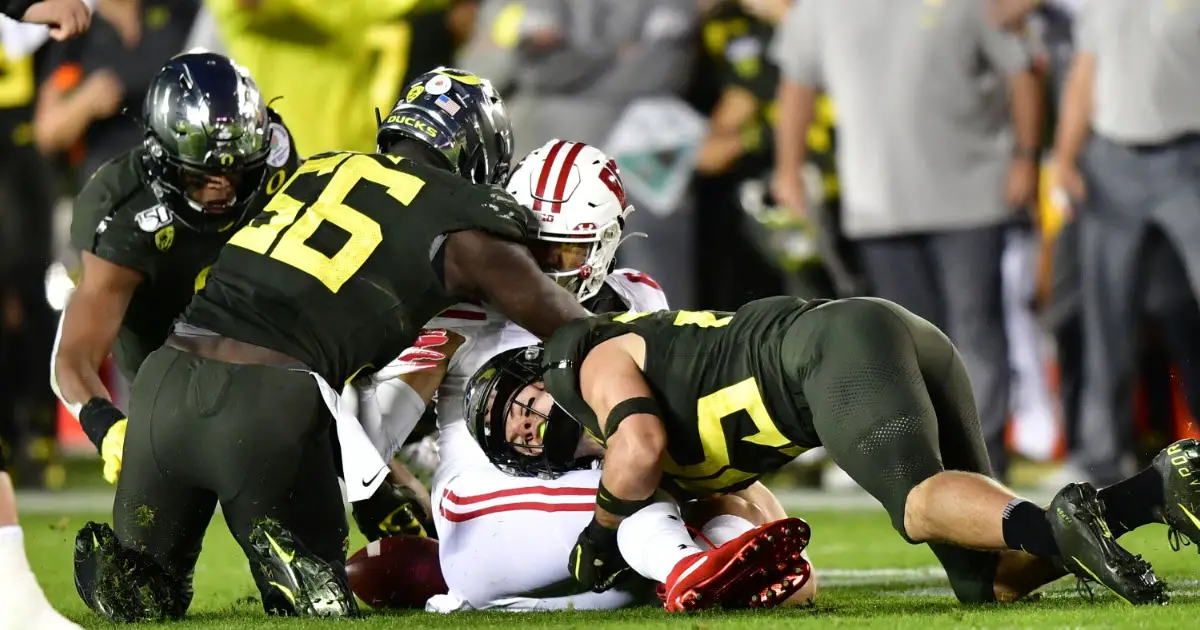It was 5:12 in the evening on New Year’s Day, with the sun beginning to set over Pasadena and the San Gabriel mountains. The sun also seemed to be setting on Oregon’s hopes of winning the 106th Rose Bowl.
But in a dramatic turn of events than now ranks with the great moments in Ducks football history—unfolding in less than a half hour of real time—this team roared back to life to take that Rose Bowl trophy home to Eugene for only the fourth time in 126 years of playing football.
The fourth-quarter game clock had just gone under eight minutes, and Wisconsin not only held a 27-21 lead but seemed to be on its way to another score. By this point the Badgers were already leading in nearly every major statistical category: more first downs, more rushing yards, and more passing yards. And now, with the game nearly seven-eighths done, they were within 10 yards of the red zone.
Even a field goal at this point might have sealed the game for Wisconsin, which was seeking its third Rose Bowl win of the modern era and its first since legendary head coach Barry Alvarez—now watching nervously from a stadium suite—retired.
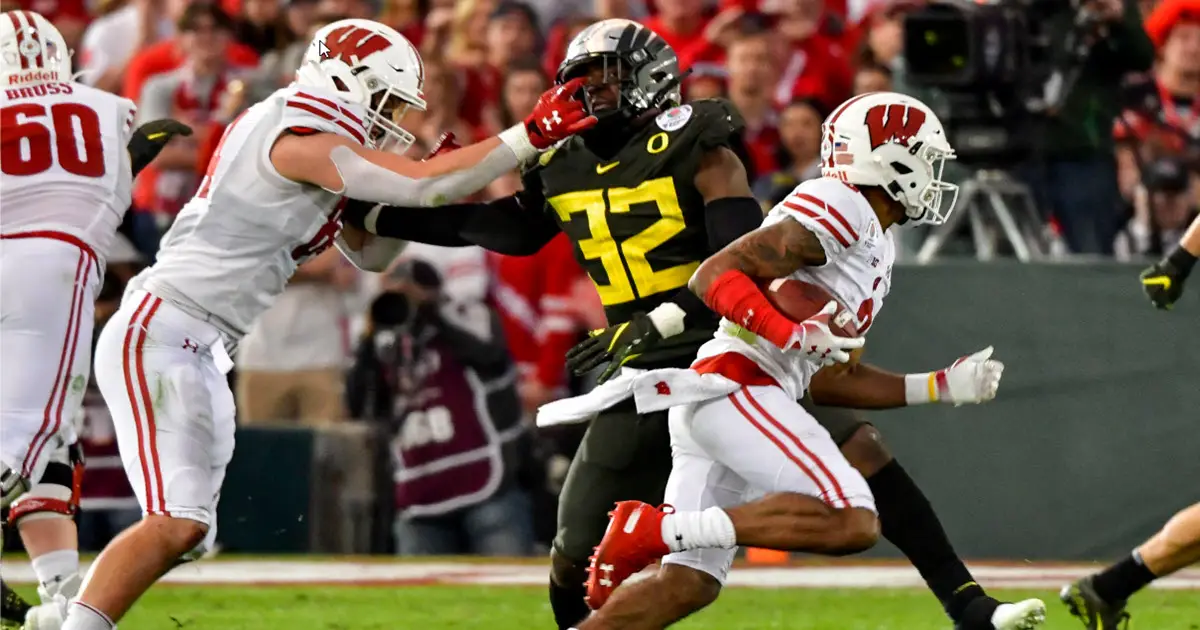
Wisconsin hurt Oregon on the edges with good blocking and a bit of face-masking on La’Mar Winston.
For much of the second half, Wisconsin caused Oregon’s defense trouble by attacking the edge: not zone-read option football like that masterminded by Chip Kelly, but a series of jet sweeps and other plays from their pro set. Running up the middle is always the Badgers’ bread and butter, which became the boxer’s body blows to set up these edge-run hooks and uppercuts. Would it send Oregon to the canvas?
That’s when Danny Davis III met defender Brady Breeze in a head-on collision.
Breeze, already a hero for his scoop-and-score play in the third quarter that took advantage of a Wisconsin punter’s fumble (itself caused by a tsunami-like Oregon rush), met Davis like a missile. It took time for Breeze to become a star for the Ducks. Heck, it took Chad Cota‘s nephew time just to become a starter. But like Cota, who starred for the Ducks in that magical Rose Bowl season of 1994, it was never in doubt that Breeze could put on a hit.
Thankfully for Davis and Breeze, that hit wasn’t an act of targeting the helmet but instead pried the ball from Davis’s grasp. Bryson Young was there to make sure the opportunity wasn’t lost by falling on the ball. (See top photo by Tom Corno that captures the moment after the ball is jarred loose by Breeze and just before Young pounces on it)
“Yeah! Come on, come on,” head coach Mario Cristobal could be seen screaming from the sideline. He knew this fourth Wisconsin turnover of the game was perhaps the most crucial of all. It meant that while the Badgers were still doing what they did best—a Big Ten conference leader in time of possession and rushing—the Ducks’ defense was also doing what they did best: creating turnovers.
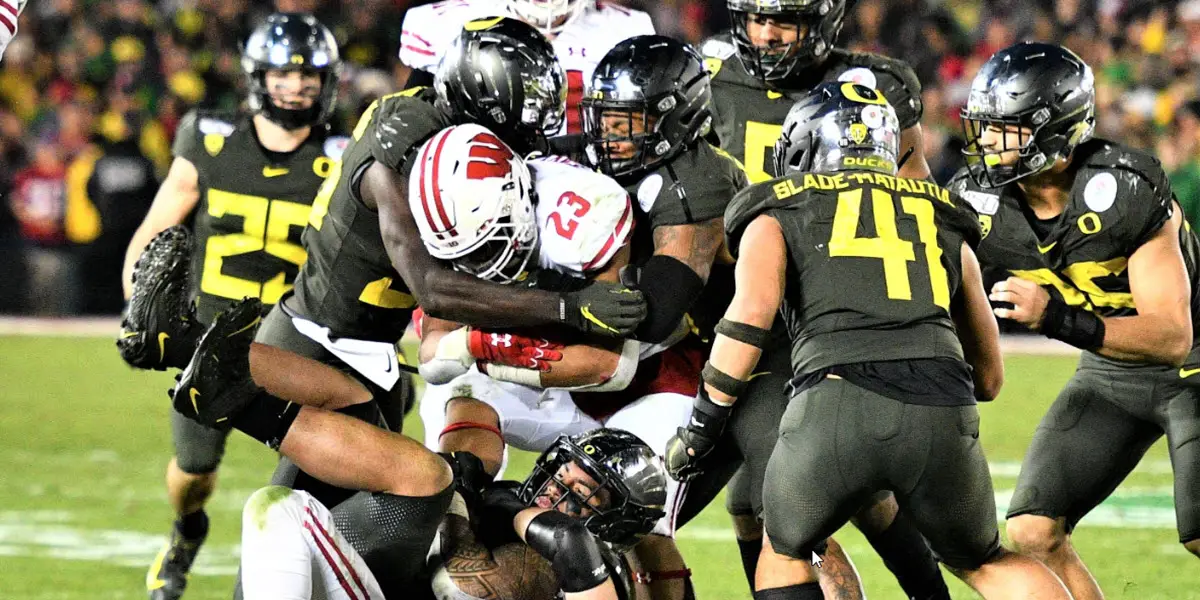
The Ducks defense in the Rose Bowl was superb against Badger Jonathan Taylor.
Perhaps more than any Oregon team in history to win a major January bowl, these Duck defenders just would not let their team lose, even when their offensive counterparts were not putting up anything close to their best performance.
The game clock was at 7:51 as quarterback Justin Herbert lined up a few feet behind center Jake Hanson in shotgun formation. This wasn’t the pistol offense we’ve seen for much of the last two years. Given the play about to unfold, the pistol would have put Herbert too far back. Let’s just say he had places to go.
Going into this Rose Bowl, the Oregon quarterback had only scored one rushing touchdown all season. In retrospect, it’s clear that Cristobal and offensive coordinator Marcus Arroyo didn’t want to risk injuring their star during the regular season, but beginning with the Pac-12 title game, they decided to set him free. There were times during those 12 games when a few Herbert runs would have kept defenses honest.
But no matter what one thinks of holding him back, it’s clear setting him free in these two games became Oregon’s not-so-secret weapon. And in this Rose Bowl, when Oregon could only drive down the field and score on its first possession of the game, turnovers and Herbert running were the two essential ingredients in victory.
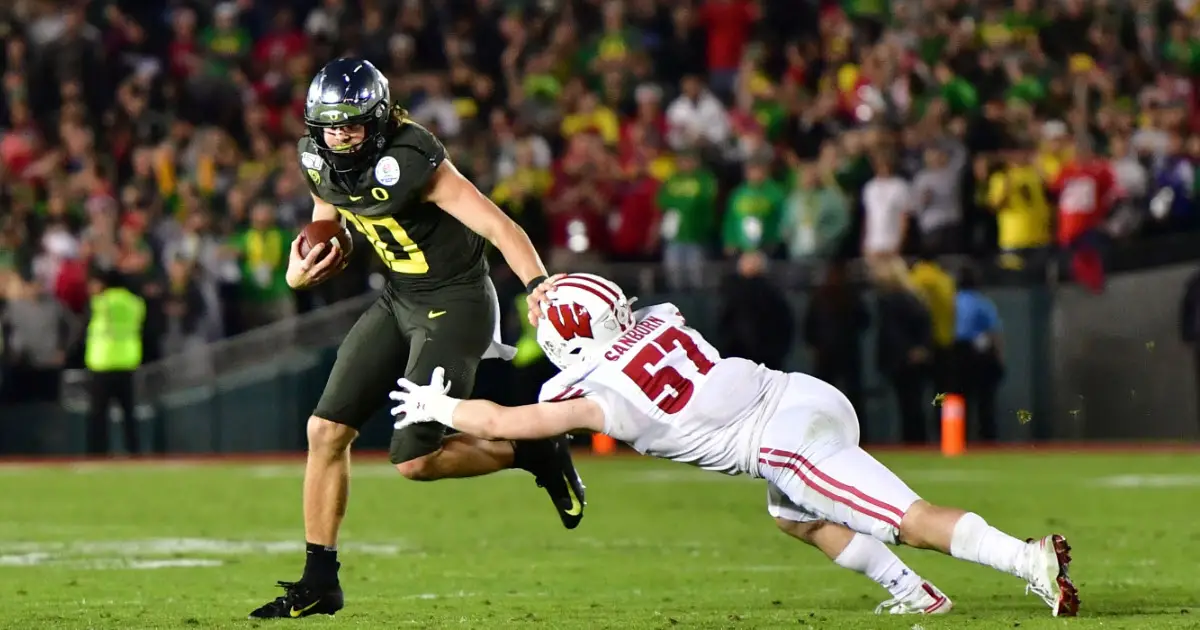
Justin Herbert’s stiff-arm of Jack Sanborn changed the game.
Before the ball was snapped on this now-historic play, Herbert looked right. He didn’t look left. That turned out to be a bit of foreshadowing, for after the hike, he faked a handoff to C.J. Verdell as the offensive line all moved left, and then decisively ran right.
Although most of the Badgers were fooled on the play—charging towards Verdell as if he had the ball—not everyone went for the fake. Linebacker Jack Sandborn, who as a sophomore led Wisconsin in tackles for 2019, was there to meet Herbert right at the 30-yard line as he initially tried to run almost straight ahead. But Herbert showed his athleticism and toughness by pivoting and stiff-arming Sandborn.
By now, there was realistically only one Wisconsin defender with a chance, cornerback Faion Hicks. His fellow corner, Rachad Wildgoose, is the one who has been immortalized in photos of the play, giving chase. But really once Herbert eluded Sandborn, Oregon receivers Johnny Johnson III and Micah Pittman went to work blocking Hicks, assuring their quarterback’s clear path to the end zone.
Broadcaster Chris Fowler, calling the game for ESPN, could see the play’s inevitable result as soon as Herbert eluded Sandborn, excitedly shouting four words that should now be counted as gospel for any Ducks fan: “QUARTERBACK IN THE CLEAR!”

Justin Herbert is the “QUARTERBACK IN THE CLEAR,” thanks to Micah Pittman.
This was the sixth lead change of the game, and there were still seven minutes of game time left: a veritable eternity, and plenty of time for even the methodical Wisconsin offense. But there would not be a seventh. If the turnover and the touchdown happened in bang-bang fashion over back-to-back plays, there was now a desperate battle going on with the Rose Bowl trophy hanging in the balance.
One of the mantras that Wisconsin coach Paul Chryst had delivered to his team in this game and all season was that it didn’t matter if they made a mistake so much as it mattered how they responded to adversity. After Herbert’s go-ahead touchdown, the Badgers were determined to trade a punch for a punch. But on that ensuing drive, Wisconsin only earned a single first down. Twice the great running back Jonathan Taylor was stopped for mere two-yard gains. And then Davis, who had just coughed up the ball to enable Herbert’s go-ahead touchdown, missed a Jack Coan pass on third and eight. With 5:37 to go and still trailing by a point, the Badgers were forced to punt.
At first, when Verdell ran for seven yards on the first play of Oregon’s ensuing possession at the 5:21 mark, things looked promising. But then Herbert fumbled the snap on second and short, recovering the ball but missing the first down, and then Hunter Kampmoyer dropped an easy third-and-six catch that would have moved the chains. (We can cut Kampmoyer a break, though, because he was a key blocker on Herbert’s touchdown.) Suddenly Wisconsin was about to get another chance, and still with 4:01 left on the clock.
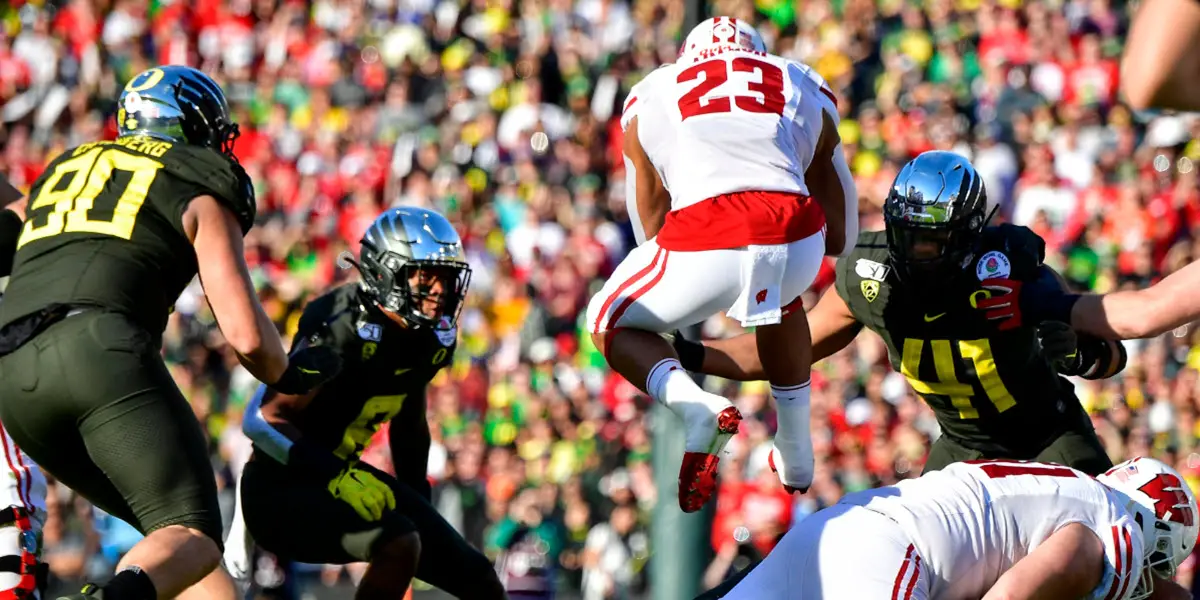
Jevon Holland and Isaac Slade-Matautia met Jonathan Taylor head-on all day.
First, Coan’s pass attempt to Kendric Pryor fell incomplete. Then Taylor ran for four yards. It was enough to give him 2,000 total yards for the season, making Taylor the first running back in college football history to achieve that milestone twice.
A side note on this impressive player: In Taylor’s previous game, the Big Ten championship game against mighty Ohio State, he ran for 148 yards and averaged 7.4 yards a carry. He surpassed the 200-yard mark in four different 2019 games. Against the Ducks, however, Taylor finished with a respectable if (for him) pedestrian mark of 94 yards, at 4.5 yards per carry. And even that was augmented by a 21-yard run. Take out that one play, and it means one of the greatest running backs in college football history ran for 73 yards on 20 carries: a measly 3.65 yards per run.
Next came the most controversial play of the game. On third and six at Wisconsin’s own 28, Coan’s completed pass to Davis, which would have been a first down, was called back as the referees flagged Davis for offensive pass interference. That’s right: the same Danny Davis III who Breeze divested of the ball, and the same Davis who missed a key third down catch on the Badgers’ last possession.
Clearly, it’s uncommon for offensive pass interference to be called in general, and with the Rose Bowl hanging in the balance, seeing it called was a surprise. But Davis did push off, however gently, and ESPN’s rules expert affirmed that the proper call was made. And even then, the Badgers did have another third-down shot after the penalty. But that Coan attempt, to Quintez Cephus, also fell incomplete.

At crunch time … Our Beloved Ducks will do what it takes to win.
Even now, there was still 2:38 left on the game clock. Oregon had the ball back, but as the Ducks learned in the Rose Bowl against the Badgers eight years earlier, that was still plenty of time.
With less than a minute to go in the 98th Rose Bowl Game and Oregon leading 45-38, future Super Bowl-winning quarterback Russel Wilson led his Wisconsin team the length of the field to what was nearly a tying touchdown. The Ducks only survived when Wilson mistakenly tried to spike the ball at the Oregon 20 with just a second left on the clock.
On this night in Pasadena, with the game even closer—the Badgers still able to take the lead on a touchdown, should they get the ball back—Cristobal and his staff made the crucial decision to stay aggressive. They may have handed the ball off to Verdell on first down, but then, on second and nine with 1:49 left, Herbert threw a 12-yard pass to Micah Pittman. Two more Verdell runs netted one and six yards, respectively, but Oregon now faced a third and three.
“I know they love their quarterback, but you would think they’d have to run on this third down,” ESPN commentator Kirk Herbstreit told Chris Fowler in the broadcast. “But every time you think they’re going to run, they end up showing that they trust Herbert to make good decisions.”
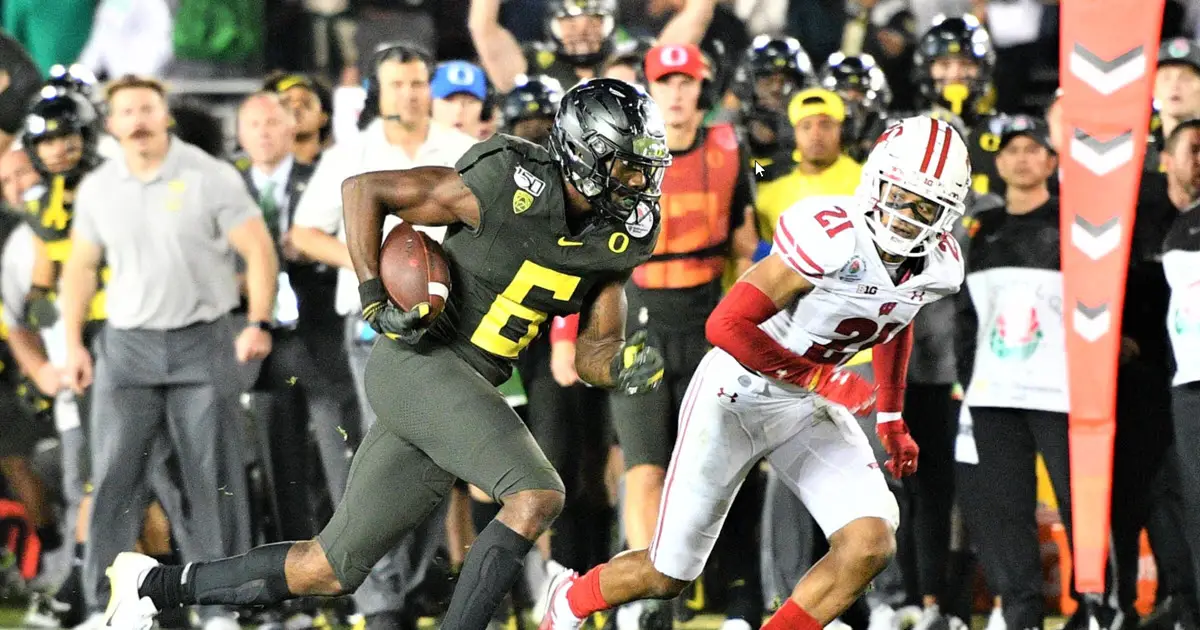
Juwan Johnson secures the winning first down in the Rose Bowl.
Sure enough, in a play all Oregon fans will forever remember, instead of running up the middle, Herbert threw a short pass to Juwan Johnson that netted 28 yards and sealed the game.
“Oregon, you gotta love their aggressive attitude, man,” Herbstreit continued. “They said, ‘We came here to win this game, not by being passive.'”
Herbert and the Oregon offense ran two plays in victory formation at the Wisconsin 9-yard line, and as the clock reached zero, it was 5:40 pm. In eight minutes of game time and 28 minutes on the real clock, Oregon turned what seemed like a defeat into victory.
In the team’s eighth Rose Bowl, this win brought the Ducks to a .500 record (4-4) in the most glorious and storied college bowl game of them all. On what is arguably the greatest stage in all of American sports, this turned a great season into an all-time Oregon Ducks legacy—one on which the sun will never set.
Brian Libby
Portland, Oregon Incredible Top Photo by Tom Corno
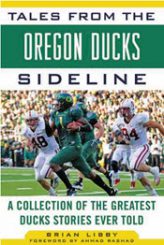
FishDuck Note: Brian is a professional writer who contributed this for fun, but he did write a wonderful book about Oregon football that I highly recommend for you and for your Duck fan friends as a present. Being so busy, he cannot write for us often, but I am a big fan of his work and am very grateful. Charles Fischer
Related Articles:
Brian Libby is a writer and photographer living in Portland. A life-long Ducks football fanatic who first visited Autzen Stadium at age eight, he is the author of two histories of UO football, “Tales From the Oregon Ducks Sideline” and “The University of Oregon Football Vault.” When not delving into all things Ducks, Brian works as a freelance journalist covering design, film and visual art for publications like The New York Times, Architect, and Dwell, among others.

